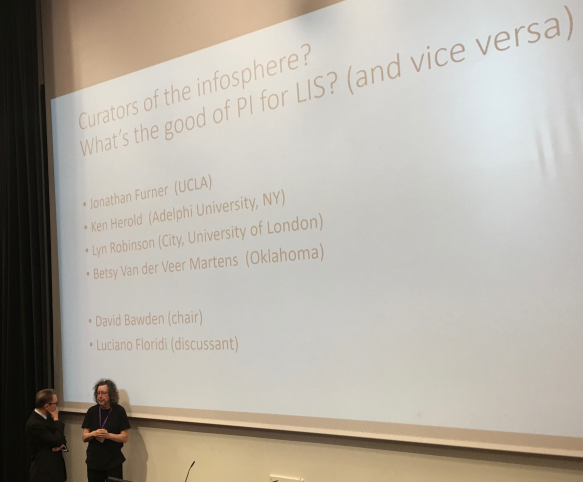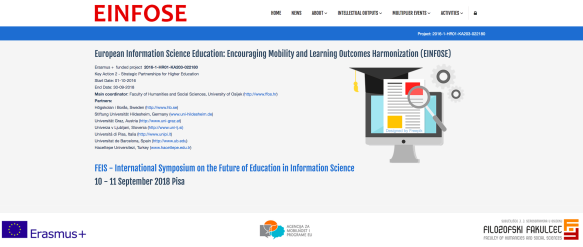
Some thoughts and reflections from the recent multiplier event for the EINFOSE project. The text is based on my presentation, and personal interpretation of discussions around international harmonisation for library and information science, (LIS) education. Views expressed are mine, and not necessarily those of the project team.
—
EINFOSE: European Information Science Education: Encouraging Mobility and Learning Outcomes Harmonization [Project Number 2016-1-HR01-KA203-022180]
Multiplier Event at the Faculty of Arts, University of Ljubljana, April 12th-13th, 2018. “Policy Recommendations for the Harmonization of Entry Requirements and Learning Outcomes in Information Science”.
—
The ways in which library & information science (LIS) are perceived as a discipline, and how it is taught internationally, are of pivotal interest to me. I was therefore, pleased to be invited to attend, and contribute to, a multiplier event for the EINFOSE project. This project considers how LIS education could be harmonized throughout Europe, based on a shared understanding of the goals of LIS, awareness of the benefits to embracing cultural differences throughout the profession, and the desirability of mobility for the workforce.
The project is focused on alignment and harmonisation of LIS courses between the project members initially, but perhaps with wider impact over time. Harmonisation requires understanding and adjustment of several course aspects so that greater mobility for students can be encouraged, and clear routes to employment established. I recommend the project website for those interested in further details, publications and updates.
The multiplier event was held over two days at the Faculty of Arts, University of Ljubljana, and I was delighted to have the opportunity to catch up with longstanding colleagues from Slovenia, Croatia, Hungary, Germany, Sweden and the UK, and to make new acquaintances.
The programme consisted of a project update, followed by conceptual and technical presentations, and round table discussions.
Sessions identified and considered criteria for the harmonization of LIS education within Europe. Discussions arose around the disciplinary boundaries of library and information science, levels at which LIS is taught in European institutions, the ways in which content is delivered, entry requirements for admission to LIS courses, the skills acquired by LIS graduates, alignment of skills with the workforce and job opportunities, challenges to LIS education and future plans.
Summary
Library and information science is the discipline which allows humankind to record its activities and achievements; it is the foundation on which our civilized world is built, and is worth supporting, encouraging, promoting and keeping. Courses in LIS are an essential component of this infrastructure. International harmonisation of LIS courses would enhance the reputation and popularity of LIS courses, allowing graduates to study more widely, and to be eligible for employment opportunities according to demand.
Such an aim will require a closer connection with employment opportunities, which in turn will rely upon a wider understanding and promotion of how library and information skills support civilized society.
Ultimately, we could imagine an international set of LIS courses, with an excellent reputation, where employment opportunities for graduates are plentiful, based on clearly recognised and communicated skills and abilities.
What is Library & Information Science?
A fundamental issue to first address for any project such as this is how to define library and information science, and the questions it addresses. Only once an agreed understanding has been acheived, can we think sensibly about harmonisation of course content, knowledge, skills and competencies transmitted, and careers for our graduates. Beyond defining library and information science per se, sub-themes emerged, examining the relationship of library science to information science; the relationship of data science to (L)IS; the division between skills and competences for those wishing to work in a library, and those aiming for a career in information science; and the relevance of information literacy to LIS syllabi, in an increasingly digital world, tasked with ‘fake-news’ ‘post-truth’ and manipulative, algorithmic inference and profiling.
There was general agreement as to the overlap with information literacy, and with change management in as much as it involves informational processes, but a more fundamental consensus seemed needed on the core content of LIS. It seemed as though for some, LIS still faces the old accusation (1980s?) that as a discipline, it has nothing unique to offer. I am continually perplexed by the need to revisit this question, as I think LIS has been defended as a separate discipline many times, not least within my own department, CityLIS, which regards LIS as “the spectrum of activities associated with the processes of the information communication chain, and the interactions between them”. As technological progress continues apace, it becomes increasingly difficult, and perhaps meaningless, to assign informational skills and understanding to either library science or information science, and the concepts of intention or focus are perhaps the ways in which we now understand the differencies between library science and information science. The difference between library and/or information science then, depends on the focus taken for any given process within the chain.
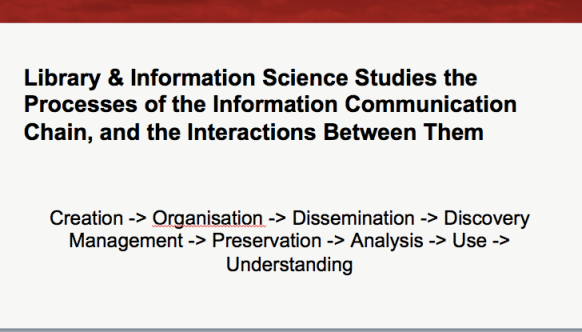
Robinson, L (2018)
This approach to allows us to translate LIS content into a collection of related modules which may be considered of equivalent effort and credit. The modules may be designated as either core or elective content according to the main focus of the overall programme. This is important for any moves towards harmonisation, as it allows a student to take one or more individual modules from different institutions, to make up their full qualification.
The ‘information chain’ perspective is prominent in schools of thought where LIS evolved from the documentation movement, around the start of the 20th Century (see Otlet, 1934 and ASIS&T). Our activities stem from humanities and social sciences, in contrast to the understanding of information science often found in US programmes, which align more with information theory, and are based in the mathematical underpinnings of computer science.
Information science is the quantitative study of properties of information, particularly: entropy, information theory, and communication theory; economics, value of information, information accounting; encryption, and information security; extraction of information from data; and emission and transmission techniques. This study is typically rooted in the computing and engineering disciplines.
(from the classic text of D.G.Luneberger, Information Science, Princeton; Princeton University Press, 2006).
If we try hard enough, we can see that everything is connected. Nonetheless, disciplinary boundaries, liminal areas and relationships provide a framework that helps us to understand ‘who we are’, and how what we study, practice and investigate, and the methods we use to answer questions, relates to other disciplines. The distinction helps us to understand how we approach problems, and how we can combine our perspective with those of others to bring about innovative thinking for new ideas, services and solutions.
On a more practical level, disciplinary boundaries underpin our education and research infrastructures, direct international and state funding, and define awards made by funding bodies. It is important that attempts at harmonisation take this milieu into account. Beyond the academy, disciplinary segregation can be seen in professional bodies, and the workforce. Although LIS skills tend to be applicable to many roles across sectors, in some locations, work in the library sector is seen as distinct from positions in IT, web design, information architecture or publishing, for example, although all of the latter roles could be found within a library environment.
Further to an agreed definition for LIS, we noted the need for LIS courses to proffer a clear view of the concepts/definitions fundamental to our field, those of data, information, knowledge, wisdom and understanding. There are no definitive definitions within LIS that I am aware of, although we have our own at CityLIS, but students need to have a foundation for these concepts in order to study pretty much anything else in LIS, and these foundations need to be made explicit, if courses are to be harmonized.
LIS and Data Science
There is then the question of how LIS educators should address the relationship of LIS to data science. With the rise and rise of big data, this latter discipline is seen somewhat as the golden goose to which everything sticks. Nonetheless, LIS is certainly not data science, and our reputation would suffer as badly from siting itself at the soggy end of data science, in as much as it does by peddling the softer skills of computer science as its main content.
Aspects of data science, and indeed computer science, are, without doubt, useful in engagement with the processes of the information communication chain, but we should be cautious about claiming to be data science or even data science ‘light’.
The disciplinary content of LIS can be found in text books, in overviews given by professional bodies, job descriptions, and both academic and professional course syllabi. Whilst each rendering may offer slightly different extensions and emphases, it is clear that there is a core content, around the processes of documentation and communication. See for example, the classic text by Bawden and Robinson, Introduction to Information Science, 2012.
Doubtless such examples can be found for data science too, but as a starting point from which to compare the realm of data science with that of LIS, see: The Modern Data Scientist Infographic, by Frank La Vigne. http://datadriven.tv/blog/modern-data-scientist-infographic/
At the current time, the content is quite different from that associated with LIS. There is always the possibility however, that the questions and problems addressed by LIS and its related methods, may evolve: the record of humankind may one day be a question for data science.
A member of the audience suggested that we could remind ourselves of the relationship of LIS to data science by focusing on the fact that LIS is concerned with documentation and keeping the record; the creation, dissemination, management, preservation and access to data files and associated software tools. This would include management of data files, data wrangling, or analytics.
Data science, however, is rather more about statistical analysis of, and prediction from, big data. See: Doing Data Science, by Cathy O’Neil and Rachel Schutt.
Further insight into the current extent to which data analytics relates to LIS may be gained by examining the content of coding courses such as Library Carpentry, or the Programming Historian. The skills gained by those taking these courses are arguably within the disciplinary area of LIS, especially in respect of systems librarianship, and the digital humanities.
Multi and Interdisciplinary Nature of LIS
An acknowledgement of the composite nature of LIS is essential for any process of harmonisation. If we examine this nature, it is perhaps twofold. Firstly, the processes of keeping the record are a valid concern for any subject, and thus LIS attracts students, researchers and practitioners from many backgrounds and areas of subject expertise. As the nature of each discipline will impact upon the ways in which it is communicated, we can say that LIS is multidisciplinary.
Secondly, the academic understanding and vocational practice of LIS requires us to embrace understanding and techniques from a variety of disciplines. In addition to our well-known overlap with computer science, we have from the earliest times embraced tools and techniques from the academic study of literature, languages, science, statistics, psychology, publishing, media studies, and cultural studies. The relative disciplinary newcomers of data science and the digital humanities have already made their impact on LIS felt. As LIS incorporates concepts from a range of fields, a diffusion of ideas if you like, we can understand LIS as an interdisciplinary domain.
Disciplinary edges are always moving, and a good place to begin the processes of harmonisation is with a conversation on the nature and definition of our subject, with reference to its origins, its current reach, its relationship with other disciplines, the variety of ways in which it is understood, and its anticipated future.
The Levels at which Courses are Offered
Some European institutions offer LIS qualifications at both undergraduate (UG) and postgraduate (PG) level, in contrast to the UK, where courses tend to be delivered only at postgraduate level. In the UK, LIS tends to be regarded as a meta-discipline, and only a few courses offer generic instruction at undergraduate level, without the student having gained experience in another discipline per se.
For harmonisation, there is a need to consider what it means to teach at both undergraduate and postgraduate levels, and consequently the division of content, skills and competencies between courses.
See here for a list of CILIP accredited courses at UG and PG level.
We considered the courses offered by the partner institutions, and the content that would be appropriate at each level. There was a query as to whether a master’s course should cover material that has already been presented at UG level; presumably for those who enter the course from another disciplinary background. In the partner institutions, entry to PG courses is often restricted to those who have already completed the UG course. In these instances, those taking the PG course would expect a more advanced, or extensive course content than that offered by the UG course. For students to be able to move between courses internationally, the content offered at each level needs to be clarified and agreed.
International bodies such as IFLA suggest standards and levels for LIS course content. In the UK, organisations including the Quality Assurance Agency and CILIP provide similar benchmarks, and other countries may also have reference bodies that act in an advisory capacity. Harmonisation efforts should take advantage of exisiting standards where possile, and address the need to have meaing beyond the academy.
For international mobility, the number of credits for each module, and for the course overall would also need to be standardised, along with the hours of study, and the timing of the terms within the academic year.
Entry Requirements
Entry requirements for LIS courses differed between countries, and this would need to be standardised for harmonisation. It was notable that for UK postgraduate courses, we are keen to attract a cohort comprising diverse disciplinary backgrounds, and so we accept anyone with a good first degree, equivalent qualification or experience. We do not see ourselves as gatekeepers, and believe that LIS is relevant to everyone, even those not employed in obvious LIS professional positions.
In other countries, those without an undergraduate qualification in LIS may be prohibited from studying the discipline at master’s level, or may at least need to attend, and gain enough credits from, a summer school before entering the PG course.
The benefits of opening up LIS master’s courses to graduates from other disciplines were readily agreed: enhanced subject profile, more diverse content, greater graduate mobility. The question of how to encourage applicants from a wider disciplinary background in countries where entry to the master’s level is usually via progression for those who have already completed the undergraduate qualification, was harder. The pool of students available from UG courses is limited, and the courses and the profession as a whole would gain from a wider admissions policy. This would require changes in administration at higher levels within respective universities however; it would not be merely a decision for the department offering the course. The image of the profession, potential salary and career prospects are important here.
I raised the issue of gatekeeping. I believe our admissions policies should be as broad as possible, to allow anyone who wishes to study LIS, for whatever reason, to do so. Of course, economics cannot be ignored, and whilst in the UK, postgraduate study is run according to demand, i.e. students pay the university, in other countries tuition is sponsored by the state. In this case, limits to who can enter the course may apply, and may be more firmly tied to actual or perceived employment opportunities.
Skills and Competencies
It is hard to think of any academic courses today that do not strive to ensure that their content relates to knowledge and skills required for the workplace. LIS courses are no exception, and the full benefits of harmonisation will only be realised if we have a rigorous and explicit understanding of expected course outcomes at both UG and PG level, how these relate to the tasks carried out by the workforce, and further to the knowledge and abilities anticipated by employers.
Additionally, it is necessary to clarify the skills and competencies that an employer might expect of a master’s graduate, in comparison to someone who had studied only to undergraduate level.
An overarching issue is one of employment opportunity, and this has to be linked to our understanding of LIS as a discipline, to ensure that LIS graduates are aware of the range of positions that they could attain, given their knowledge background, and accompanying skillset.
See for the UK, CILIP’s Professional Skills and Knowledge Base.
This is hard to achieve in practice within any one course or country, and will be harder to standardise within Europe and on a further international scale.
I have encountered on previous occasions, tensions between the competencies and skills that can be reasonably expected from new LIS graduates, and those that employers would like to see from job applicants. I have noted specifically, that employers wish for skills and competencies that might be attributed to an employee after 3-5 years with the organisation – insight based on an intimate knowledge of specific organisational practice, and a significant level of what we may call personal maturity and confidence.
To solve this, educators need to work with employers within the sector, to establish a dialogue around the interconnection of academic courses with the professional knowledgebase and skills. We need to establish, regularly review and update, attainments that can be delivered over the course of an academic qualification, and that which has to happen as work experience or continual professional development, CPD. At the same time, whilst we cannot pretend that any LIS course can ever be a final aspiration for the abilities needed throughout a career, we need to clarify, communicate and promote the significant benefits to studying an academic master’s course. It should be obvious that an educated workforce underpins a prosperous organisation, but a direct connection between course content and organisational prosperity is hard to realise. In the UK, the professional body CILIP has opened this conversation, having held two annual forums for discussion between LIS educators and employers, and having scheduled a colloquium to take place at the CILIP conference in July 2018.
To promote harmonisation, it will be necessary, and should be possible, to identify core understanding and abilities offered by LIS courses, in alignment with the level at which the course is taught, at both course level, and for individual modules. Country specific, unique modules or content should be celebrated and promoted as a benefit of mobility. These should be readily communicable to employers.
There was much discussion about the skills and competencies offered for those enrolled in library related courses in comparison to those enrolled in information science courses. Many of these were overlapping. The spectrum of LIS competencies seen in the UK differed from those in Europe, (e.g. Slovenia, Croatia, Sweden and Germany) where a more distinct emphasis between library and information science syllabi was evident.
The approach at CityLIS, where skills and competencies are seen on a spectrum of activities around the processes comprising the information communication chain, was somewhat unique, as other countries emphasized the differences between course content, and subsequent job skills, for library science and information science.
In Germany for example, entry to Information Science required NLP, programming and information retrieval. In Sweden, there is a clear distinction between the library course and the information science route, which is called ‘Information Architecture’.
The collection, service related skills of the librarian, tend to be regarded throughout Europe as very different from those attributed to information science, which seems to embrace content from computer science, through data science, to information science as understood from a US perspective.
Whether it is beneficial to differentiate skills associated with working in an identifiable library post, with those employed in other areas of information work needs further discussion. As libraries become more dependent on technology, the division by the library or non-library label, rather than focus or area of personal/professional interest is perhaps limiting.
Employment
At CityLIS, we do not notice that jobs awarded to our graduates relate to whether the PG qualification held is in either library science or information science. The important factor is the degree per se, and any course work, especially the dissertation, which may pertain to the job description in some way.
This may differ in other course and in other countries – France for example, immediately springs to mind, as the difference between the librarian, and in the information specialist, or documentalist is very clear, with different routes of study, leading to different career options.
For LIS courses, an understanding of the number and nature of employment opportunities for graduates is a priority. It would clearly be advantageous if this could be administered on a national, European or international basis, to allow educators to plan courses based on up-to-date evidence, and to ensure that workplace demand is filled with appropriately skilled graduates. There are caveats here, which assume that workforce data allows for speculation and surprises, and that we cater for the unknown – not all LIS graduates enter the job market immediately; some may wish to continue to PhD study, to enter the academy, or to enter the profession with research skills and competencies.
Alen Doracic reported on an analysis of the Swedish system, where the workforce in LIS institutions had been examined, and correlated with the number of graduates emerging from the Swiss LIS schools. The figures were the most encouraging that I have seen, in that supply and demand were reported as even. This assumes, however, that nothing in the sector will change.
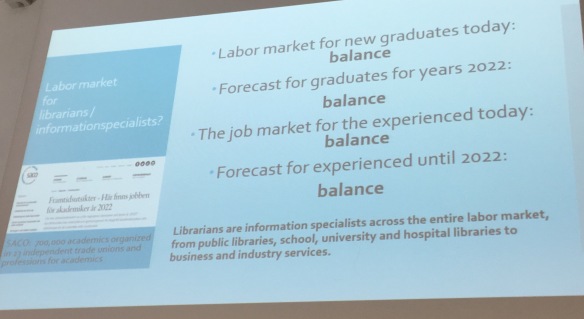
Doracic A, 2018. Slide shown at EINFOSE Multiplier Event in Slovenia, April 12th -13th.
Doracic also showed another slide, which identified the skills and abilities perceived as most lacking in LIS graduates – it makes interesting reading.
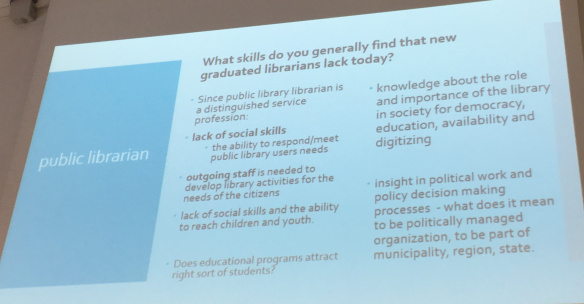
Doracic A, 2018. Slide shown at EINFOSE Multipier Event in Slovenia, April 12th-13th.
Challenges
The main challenge to international harmonisation of LIS courses, between the project participants, and beyond, is the lack of a widely acknowledged understanding of our discipline, and how the knowledge, skills and competencies offered by LIS relate to the workforce.
Information related positions outside libraries and information centres are hard to define and document, and whilst it is easy to claim, probably correctly, that many jobs require information skills, it is difficult to collectively identify them all, let alone deconstruct the informational skills needed, and translate them into course content.
Further, although much speculation on the future of the workplace is readily found, precise data on future roles and the need for library and information skills is elusive. The sector changes rapidly, and at a pace beyond that which university governance procedures function, so that academic courses struggle to stay relevant.
Nonetheless, I think we can be sure that as more and more digital information pours into our world, we will need more and more human resources to deal with it. Keeping the record is not likely to become irrelevant.
Another challenge is that our discipline is not perceived as large, and hence relevant. We need to collect evidence for the size of our profession; looking at the numbers of students on LIS courses, and the numbers of people reportedly employed in the sector, and comparing these figures to those from other fields such as science, engineering, health, technology, law and business.
See, for example, CILIP’s 2015 results from a study of the UK information workforce, which suggests 86,376 people are employed within the sector.
Interestingly, in an earlier report from 2014, the workforce is estimated to be larger, 270,000.
We are also disadvanted by remuneration. Most positions initially gained by LIS graduates do not attract very high salaries, see HESA Destinations of Leavers for latest UK graduate employment and salary figures, although it is not possible to see results just for gradualtes from an individual LIS PG course. In the UK, as well as perhaps in Europe, librarianship is not regarded as a glamorous profession, although there is a strong vocational and ethical following, as exemplified by those advocating for public and school libraries. Roles regarded as being based more in the field of information, such as law, business or technology, tend to attract higher salaries and hence, higher regard. Information from employment agencies such as Sue Hill Recruitment could confirm this.
If we are advocating international harmonisation, it would be good to make explicitly clear its intended impact, with specific regard to the numbers of students on courses, and the consequence for the profession. Is the intention to fill currently unfilled positions, or is it to promote LIS graduates for positions currently taken by graduates from other disciplines?
It is likely that limitations on employment opportunities (whether perceived or actual) reflect the number of graduates wishing to study LIS. At my own institution, applications for Data Science courses are roughly three times those for LIS. More detailed insight into why graduates choose their subjects would be helpful, although it is clear that LIS would, as always, benefit from an enhanced profile as a profession. Not an easy task, but one which international harmonisation should surely take on board.
Restriction of entry to postgraduate courses to those students who have taken an undergraduate course in LIS is likely to be detrimental to growth and mobility. Issues such as modularization, and credit assignment are relatively small issues.
The situation for library related roles in the US may be different, but that is another post.
Future Plans
International harmonization of LIS education would seem a worthwhile goal for those involved in course design, development and delivery throughout Europe and beyond.
Once again, I am grateful to the organisers of the EINFOSE project, for the opportunity to participate in this discussion.
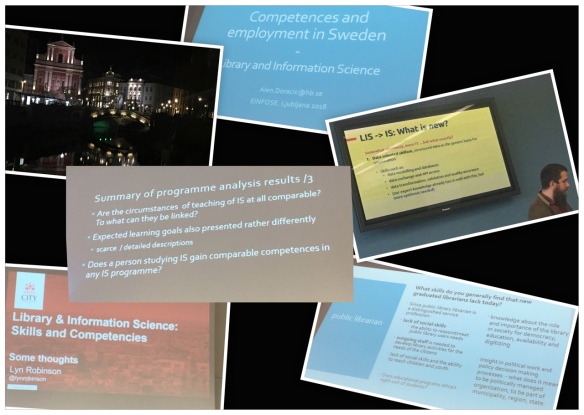
References
Bawden D and Robinson L (2012). Introduction to Information Science. Facet.
Otlet P (1934). Traité de Documentation, le livre sur le livre. Mundaneum.
Related Links:
1. David Matthews (2018). Bologna Process still ‘treading water’, say critics
Nearly two decades on, reports suggest the goal of a unified higher education area in Europe is still some distance away
Times Higher Education, May 29th 2018
2. Towards a European Education Area








